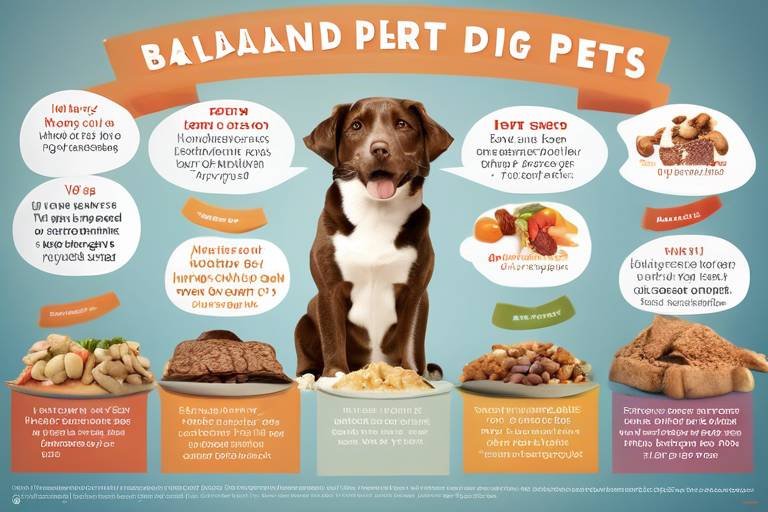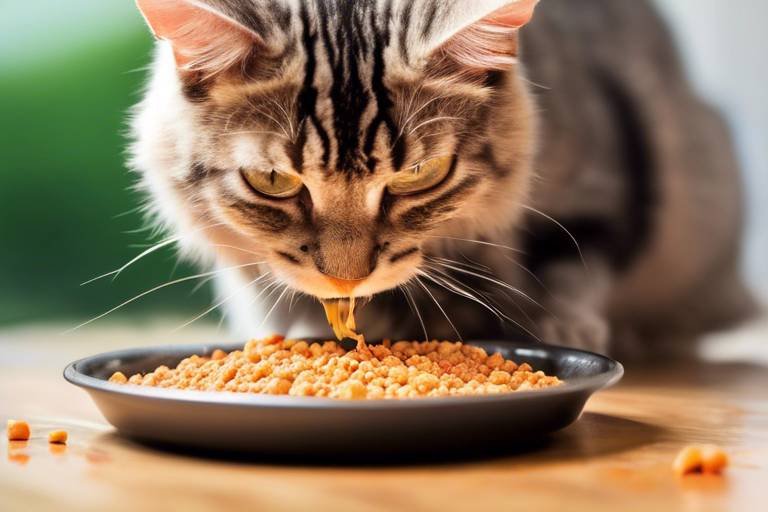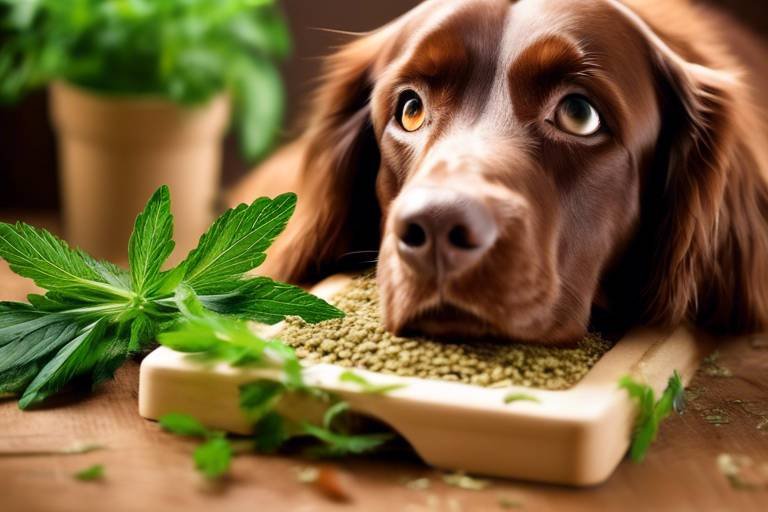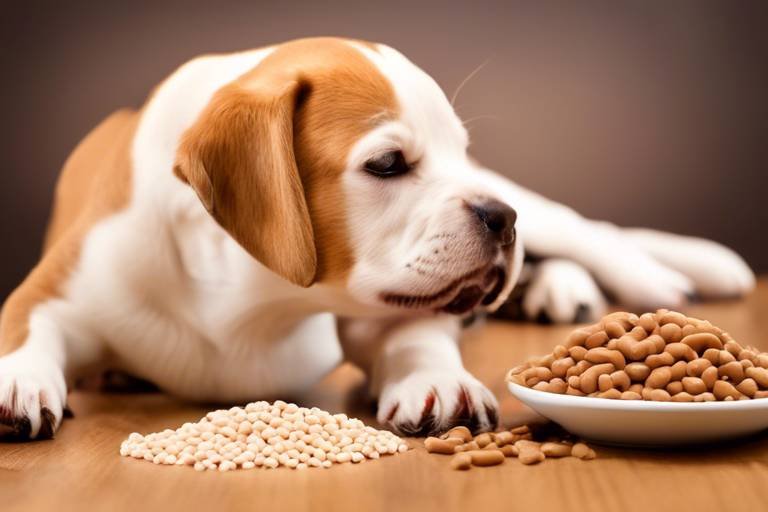The Importance of Omega-6 Fatty Acids in Pet Diets
When it comes to our furry companions, their health and wellbeing are of utmost importance. One of the key components that play a crucial role in their overall health is omega-6 fatty acids. These essential fats are not just a trendy topic in pet nutrition; they are vital for maintaining a balanced diet. Imagine omega-6 fatty acids as the unsung heroes of your pet's diet, quietly working behind the scenes to support various bodily functions. From promoting healthy skin to boosting immune responses, omega-6s are indispensable for your pet's vitality.
But what exactly are omega-6 fatty acids? Simply put, they are a type of polyunsaturated fat that pets cannot synthesize on their own, meaning they must be obtained through their diet. These fatty acids are involved in numerous physiological processes, including cell structure, hormone production, and inflammation regulation. In essence, they are the building blocks that help keep your pet's body functioning optimally.
As pet owners, understanding the importance of omega-6 fatty acids can significantly impact your pet's health. This article will delve into the health benefits these fatty acids provide, the best sources to include in your pet's diet, and how to maintain a healthy balance with omega-3 fatty acids. By the end, you'll be equipped with the knowledge to make informed decisions about your pet's nutrition, ensuring they lead a happy, healthy life.
Omega-6 fatty acids are a group of essential fats that are crucial for your pet's health. They belong to a larger family of fatty acids known as polyunsaturated fats. The most common omega-6 fatty acid is linoleic acid, which serves as a precursor to other important fatty acids in the body. Think of omega-6s as the foundation of a house; without a solid base, everything else is at risk of collapsing. These fats are integral to maintaining cellular integrity and supporting various biological functions.
To grasp the significance of omega-6s, it's important to recognize the different types. Omega-6 fatty acids can be classified into several categories, including:
- Linoleic Acid (LA): Found in many vegetable oils.
- Arachidonic Acid (AA): Important for inflammatory responses.
- Gamma-Linolenic Acid (GLA): Known for its potential health benefits.
These fatty acids work synergistically to promote health, but they must be balanced with omega-3 fatty acids for optimal effect. When included in the right proportions, omega-6 fatty acids can help maintain your pet's wellbeing, making them a critical component of any pet diet.
Now that we understand what omega-6 fatty acids are, let’s explore the myriad of health benefits they offer to our pets. From enhancing skin health to supporting the immune system, these fatty acids are truly multifunctional.
One of the most notable benefits of omega-6 fatty acids is their ability to promote healthy skin and a shiny coat. Pets that receive adequate amounts of these fats often have fewer skin disorders and exhibit a vibrant coat. Imagine omega-6s as the nutrients that keep your pet’s skin hydrated and resilient, much like a moisturizer does for human skin. They help form a barrier that locks in moisture and keeps irritants out, reducing the likelihood of allergies and skin problems.
Omega-6 fatty acids also possess anti-inflammatory properties that can help manage chronic conditions in pets. Conditions like arthritis or skin allergies can be exacerbated by inflammation, and omega-6s can play a role in mitigating these issues. By incorporating these fatty acids into your pet's diet, you may help them heal faster and feel more comfortable.
A strong immune system is essential for pets to fend off illnesses and infections. Omega-6 fatty acids support immune health by promoting the production of signaling molecules that help regulate immune responses. Think of them as the defenders in your pet's body, ready to mobilize when needed. Ensuring your pet gets enough omega-6s can be a game changer in keeping them healthy and vibrant.
Identifying sources of omega-6 fatty acids in your pet's diet is crucial for ensuring they receive adequate amounts. Some of the best dietary sources include:
- Chicken fat
- Sunflower oil
- Safflower oil
- Flaxseed oil
- Hemp oil
Incorporating these ingredients into your pet’s meals can help ensure they get the necessary omega-6s for optimal health.
While both omega-6 and omega-3 fatty acids are essential, they serve different roles in your pet's health. Omega-6s are primarily pro-inflammatory, while omega-3s are anti-inflammatory. This difference highlights the importance of maintaining a proper balance between these two types of fatty acids. Too much omega-6 can lead to an imbalance that may promote inflammation rather than reduce it.
Achieving a healthy balance between omega-6 and omega-3 fatty acids is key to optimal pet health. Ideally, the ratio of omega-6 to omega-3 should be around 4:1. This balance can be achieved by incorporating sources rich in omega-3s, such as fish oil or flaxseed oil, into your pet's diet. Regularly consulting with a veterinarian can help you fine-tune your pet's nutritional needs.
While omega-6 fatty acids are beneficial, excessive intake can lead to health issues such as obesity and inflammatory diseases. It's crucial to monitor your pet's diet and ensure they are not consuming too many omega-6s, as this can upset the delicate balance needed for optimal health. Always consult with a veterinarian to determine the right dietary plan for your pet.
Q: Can I give my pet omega-6 supplements?
A: It's best to consult with your veterinarian before introducing any supplements to your pet's diet.
Q: How can I tell if my pet is getting enough omega-6 fatty acids?
A: Signs of deficiency may include dry skin, a dull coat, or increased susceptibility to infections. Regular vet check-ups can help monitor your pet's nutritional health.
Q: Are there any risks associated with omega-6 fatty acids?
A: While they are essential, overconsumption can lead to health problems. Balance is key!

What are Omega-6 Fatty Acids?
Omega-6 fatty acids are a group of essential polyunsaturated fats that play a critical role in the health and wellbeing of our pets. Unlike some nutrients that our furry friends can produce on their own, omega-6 fatty acids must be obtained through their diet. These fats are vital for numerous bodily functions, including cell membrane formation, energy production, and the regulation of inflammation.
Understanding the structure of omega-6 fatty acids is key to appreciating their importance. They are classified as essential fatty acids because they cannot be synthesized by the body and must be consumed through food. The most common types of omega-6 fatty acids include:
- Linoleic acid (LA) - Found in vegetable oils, nuts, and seeds, this is the most prevalent omega-6 fatty acid.
- Arachidonic acid (AA) - While animals can produce this from linoleic acid, it is also found in animal tissues and certain fish.
These fatty acids are not just a passing trend in pet nutrition; they are fundamental to maintaining a balanced diet. The right balance of omega-6 fatty acids is crucial for supporting various physiological functions. For instance, they are involved in the production of eicosanoids, which are signaling molecules that help regulate inflammation and immune responses. This means that omega-6 fatty acids can help manage your pet's health on multiple fronts, making them a vital component of their diet.
Incorporating omega-6 fatty acids into your pet's meals can be achieved through various dietary sources. Common ingredients that are rich in these essential fats include:
| Source | Omega-6 Content |
|---|---|
| Chicken Fat | High |
| Sunflower Oil | Very High |
| Safflower Oil | Very High |
| Flaxseed Oil | Moderate |
| Walnuts | Moderate |
By ensuring that your pet's diet includes these omega-6-rich sources, you're not just feeding them; you're actively contributing to their overall health and vitality. So, the next time you’re shopping for pet food or treats, keep an eye out for these omega-6 powerhouses!

Health Benefits of Omega-6 Fatty Acids
When it comes to our furry friends, ensuring they receive the right nutrients is paramount for their health and happiness. Omega-6 fatty acids are among the essential fats that play a crucial role in maintaining various bodily functions. These fatty acids are not just a trendy topic in pet nutrition; they are fundamental to your pet's overall well-being. From promoting a healthy coat to supporting immune function, the benefits of omega-6 fatty acids are numerous and significant.
One of the most noticeable benefits of omega-6 fatty acids is their impact on skin and coat health. Pets that receive an adequate amount of these fats often have shiny, lustrous coats and healthy skin. Omega-6 fatty acids help maintain the skin's barrier function, which is vital for preventing moisture loss and protecting against irritants. This is particularly important for pets prone to skin conditions like allergies or dermatitis. By incorporating omega-6 into their diet, pet owners can help their furry companions avoid itchy, flaky skin and ensure they look their best.
Think of omega-6 fatty acids as the secret ingredient in your pet's beauty routine. When these essential fats are included in their diet, they work from the inside out to keep the skin hydrated and the coat shiny. This is achieved through the production of ceramides, which help retain moisture in the skin. Moreover, omega-6 fatty acids can reduce the occurrence of skin disorders, making them a vital component of any pet's diet. A healthy coat not only enhances your pet's appearance but also boosts their confidence, allowing them to strut around like the stars they are.
Another remarkable benefit of omega-6 fatty acids lies in their anti-inflammatory properties. These fats can help manage chronic conditions such as arthritis, allergies, and other inflammatory diseases in pets. By reducing inflammation, omega-6 fatty acids promote healing and improve the overall quality of life for pets suffering from these issues. Imagine your pet feeling spry and energetic again, thanks to the magic of these essential fats. It's not just about comfort; it's about giving them the freedom to play and enjoy life to the fullest!
A robust immune system is crucial for keeping our pets healthy and resilient against infections. Omega-6 fatty acids contribute significantly to immune function by aiding in the production of immune cells and modulating inflammatory responses. This means that pets with a diet rich in omega-6 are better equipped to fend off illnesses and recover more quickly when they do fall ill. By incorporating these essential fats into their diet, pet owners are not only enhancing their pets' health but also investing in their long-term vitality.
To summarize, omega-6 fatty acids are essential for:
- Maintaining healthy skin and a shiny coat
- Reducing inflammation and managing chronic conditions
- Supporting a strong immune system
With all these benefits, it's clear that omega-6 fatty acids should be a staple in your pet's diet. However, it's essential to ensure that they are balanced with omega-3 fatty acids for optimal health.
Skin and Coat Health
When it comes to our furry companions, their skin and coat health is often a reflection of their overall well-being. Omega-6 fatty acids play a pivotal role in maintaining that glossy coat and healthy skin. These essential fats serve as building blocks for the cell membranes, ensuring that the skin retains moisture and stays hydrated. Think of omega-6s as the protective shield that keeps your pet's skin from drying out or becoming irritated.
But how do omega-6 fatty acids achieve this? They help in the production of certain lipids that form a barrier on the skin, locking in moisture and keeping harmful irritants at bay. This is especially important for pets that are prone to skin allergies or conditions like dermatitis. A well-nourished skin barrier means fewer irritations, less scratching, and a happier pet overall.
Moreover, the benefits of omega-6 fatty acids extend beyond just hydration. They also contribute to the overall health of the coat. A diet rich in these fatty acids can lead to a shinier, softer coat that not only looks good but feels good too. Imagine running your fingers through a pet's fur that is as smooth as silk; that’s the magic of omega-6s at work!
Research has shown that pets with adequate levels of omega-6 fatty acids are less likely to suffer from common skin problems. For instance, conditions like flaky skin, excessive shedding, and dull fur can often be traced back to a deficiency in these essential fats. Therefore, including omega-6s in your pet's diet is not just a good idea—it's a necessity for maintaining their skin and coat health.
To ensure your pet gets enough omega-6 fatty acids, consider incorporating foods rich in these fats into their diet. Some excellent sources include:
- Chicken fat
- Sunflower oil
- Safflower oil
- Evening primrose oil
In conclusion, omega-6 fatty acids are not just another dietary supplement; they are essential for keeping your pet's skin and coat in top condition. So, the next time you notice your pet's fur shining brightly in the sunlight, you can thank omega-6s for that beautiful glow!
Q: How do I know if my pet is getting enough omega-6 fatty acids?
A: Look for signs like a shiny coat, healthy skin, and overall vitality. If your pet is experiencing skin issues, it may be worth consulting your vet about their diet.
Q: Can I give my pet omega-6 supplements?
A: Yes, but it’s best to consult your veterinarian for recommendations tailored to your pet's specific needs.
Q: Are there any risks associated with omega-6 fatty acids?
A: While omega-6s are beneficial, overconsumption can lead to inflammation and other health issues. Balance with omega-3 fatty acids is crucial.
Reducing Inflammation
When it comes to our furry companions, one of the most significant benefits of omega-6 fatty acids is their ability to reduce inflammation. Just like how a soothing balm can ease a sore muscle, omega-6 fatty acids act as a natural remedy for various inflammatory conditions in pets. These essential fats help to modulate the inflammatory response in the body, which is crucial for pets suffering from chronic conditions such as arthritis, skin allergies, and even certain autoimmune diseases.
But how do omega-6 fatty acids work their magic? They play a pivotal role in producing eicosanoids, which are signaling molecules that help regulate inflammation. Think of eicosanoids as the body's alarm system, alerting it to potential threats and initiating a response to heal and protect. When pets consume adequate amounts of omega-6 fatty acids, they can produce a balanced level of these eicosanoids, leading to a healthier inflammatory response.
Moreover, omega-6 fatty acids can contribute to the overall health of the skin, which is often the first line of defense against external irritants and pathogens. A well-nourished skin barrier can prevent inflammation caused by allergens, irritants, and infections. For instance, pets with dry, flaky skin are more susceptible to irritations that can trigger inflammatory reactions. By ensuring your pet receives enough omega-6 fatty acids, you can help maintain a robust skin barrier that keeps inflammation at bay.
It's important to note that while omega-6 fatty acids are beneficial, they should be consumed in moderation. Just like too much sugar can lead to a sugar crash, excessive omega-6 intake can lead to an imbalance in the body's inflammatory response. This is where the balance between omega-6 and omega-3 fatty acids comes into play. Omega-3s, found in sources like fish oil, are also anti-inflammatory and can help counteract the pro-inflammatory effects of omega-6s when consumed in excess.
To summarize, incorporating omega-6 fatty acids into your pet's diet can significantly aid in reducing inflammation and promoting overall health. However, it's crucial to strike the right balance with omega-3 fatty acids to ensure your pet reaps the full benefits without any adverse effects. Always consult with your veterinarian to tailor a diet that meets your pet's specific needs.
- What are the best sources of omega-6 fatty acids for pets? Common sources include chicken fat, sunflower oil, and corn oil.
- Can I give my pet omega-6 supplements? It's best to consult with your veterinarian before introducing any supplements to your pet's diet.
- How do I know if my pet is getting enough omega-6 fatty acids? Signs of deficiency can include dry skin, a dull coat, and increased inflammation.
- Are there any risks associated with omega-6 fatty acids? Yes, excessive intake can lead to health issues, so balance with omega-3s is essential.
Supporting Immune Function
When it comes to our furry friends, a robust immune system is their first line of defense against illnesses and infections. Omega-6 fatty acids play a pivotal role in bolstering this defense mechanism. Just like how a knight needs strong armor to protect against foes, pets require these essential fats to shield them from various health threats. The incorporation of omega-6 fatty acids in their diet not only enhances their overall health but also ensures that their immune system functions optimally.
One of the primary ways omega-6 fatty acids contribute to immune health is through their anti-inflammatory properties. Inflammation can be a double-edged sword; while it’s a natural response to injury or infection, chronic inflammation can lead to serious health issues. Omega-6 fatty acids help regulate this response, ensuring that it remains balanced. For instance, when your pet suffers from allergies, the inflammation can become overwhelming. By providing the right amount of omega-6, you can help your pet manage these reactions better.
Furthermore, omega-6 fatty acids participate in the production of signaling molecules known as eicosanoids. These compounds are crucial for various physiological functions, including the modulation of immune responses. They help in the communication between cells, ensuring that the immune system can respond swiftly and effectively to threats. Think of eicosanoids as the messengers that alert the body when it’s under attack, ensuring that the immune system springs into action.
To illustrate the significance of omega-6 in immune function, consider the following table that highlights the key roles these fatty acids play:
| Role of Omega-6 Fatty Acids | Description |
|---|---|
| Anti-inflammatory | Helps manage chronic inflammation, reducing the risk of related diseases. |
| Cell Signaling | Facilitates communication between immune cells for a coordinated response. |
| Barrier Function | Supports the integrity of skin and mucosal barriers, preventing pathogen entry. |
In addition to these benefits, omega-6 fatty acids are also known to enhance the production of antibodies, which are crucial for fighting off infections. Antibodies act like personalized soldiers, targeting specific pathogens that invade the body. A diet rich in omega-6 can help ensure that your pet has an adequate supply of these essential soldiers ready to defend against invaders.
However, it’s important to remember that while omega-6 fatty acids are beneficial, they should be consumed in moderation and balanced with omega-3 fatty acids. This balance is essential for maintaining an effective immune response. Too much omega-6 can lead to an overactive immune system, which might trigger allergies or autoimmune diseases. Always consult with your veterinarian to determine the right balance for your pet's specific needs.
In conclusion, supporting your pet's immune function is a multifaceted approach, and incorporating omega-6 fatty acids into their diet is a fantastic step in the right direction. By ensuring that your pet receives these essential fats, you’re not just feeding them; you’re fortifying their defenses against the myriad of health challenges they may face.
- What are the best sources of omega-6 fatty acids for pets? Common sources include chicken fat, sunflower oil, and corn oil.
- Can my pet get too much omega-6? Yes, excessive omega-6 can lead to health issues; balance with omega-3 is key.
- How can I tell if my pet is getting enough omega-6? Signs include a healthy coat, good skin condition, and overall vitality.
Sources of Omega-6 Fatty Acids
When it comes to ensuring our furry friends receive the right nutrients, omega-6 fatty acids are a crucial component of their diet. These essential fats can be found in various food sources that pet owners should consider incorporating into their pets' meals. One of the most common sources is vegetable oils, such as corn oil, sunflower oil, and soybean oil. These oils are often included in commercial pet foods, making them a convenient option for pet owners.
In addition to oils, there are several other natural sources of omega-6 fatty acids that can enhance your pet's diet. For instance, nuts and seeds are packed with these beneficial fats. While some nuts can be harmful to pets, others like flaxseeds and hemp seeds can be safely included in their meals. It's like finding a treasure chest of nutrition hidden in your pantry! Moreover, animal fats, particularly from poultry and certain fish, also provide omega-6 fatty acids, making them another excellent addition to your pet's diet.
To give you a clearer picture, here's a quick table summarizing some of the top sources of omega-6 fatty acids:
| Source | Type | Omega-6 Content |
|---|---|---|
| Corn Oil | Vegetable Oil | High |
| Sunflower Oil | Vegetable Oil | Very High |
| Soybean Oil | Vegetable Oil | High |
| Flaxseeds | Seed | Moderate |
| Hemp Seeds | Seed | High |
| Poultry Fat | Animal Fat | Moderate |
| Fish Oil | Animal Fat | High |
Incorporating these sources into your pet's diet can significantly boost their omega-6 intake. However, it's essential to remember that while omega-6 fatty acids are beneficial, moderation is key. Too much of a good thing can turn into a bad thing, right? Balancing these fats with omega-3 fatty acids, which are also vital for your pet's health, will help maintain overall well-being. So, next time you're shopping for pet food or preparing a meal, keep an eye out for these omega-6 powerhouses!
- What are the symptoms of omega-6 deficiency in pets? Pets may exhibit dry skin, dull coat, and an increased susceptibility to infections.
- Can I give my pet omega-6 supplements? Yes, but it's best to consult with your veterinarian before adding any supplements to your pet's diet.
- How can I ensure my pet gets a balanced intake of omega-6 and omega-3 fatty acids? Look for pet foods that list both types of fatty acids in their ingredients and consult your vet for personalized advice.
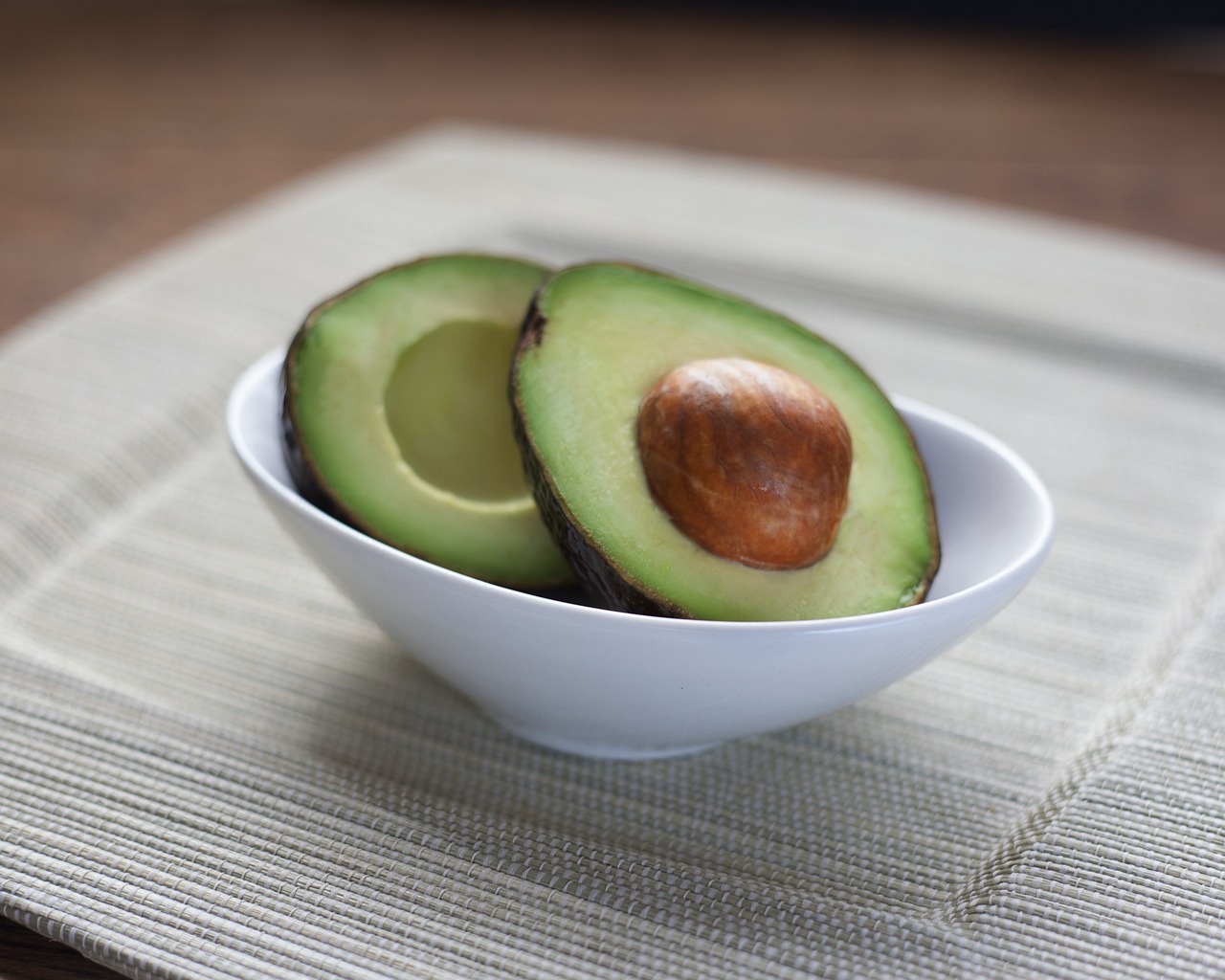
Omega-6 vs. Omega-3 Fatty Acids
When it comes to pet nutrition, understanding the difference between omega-6 and omega-3 fatty acids is crucial. Both types of fatty acids are essential for your furry friend's health, but they serve distinct functions in the body. Think of omega-6 as the 'fuel' that powers everyday functions and omega-3 as the 'brake' that helps regulate inflammation and promote healing. This balance is vital for maintaining your pet's overall health and well-being.
Omega-6 fatty acids are primarily pro-inflammatory, which means they play a role in promoting inflammation in response to injury or infection. This is not necessarily a bad thing; after all, inflammation is a natural part of the healing process. However, an excess of omega-6s can lead to chronic inflammation, which is linked to various health issues, such as allergies and skin disorders. On the other hand, omega-3 fatty acids are known for their anti-inflammatory properties. They help to counteract the effects of omega-6s, making them essential in managing conditions like arthritis and other inflammatory diseases.
To visualize the relationship between these two types of fatty acids, consider this: if omega-6s are like a fire that ignites a response in the body, omega-3s act as the fire extinguisher. Both are necessary, but without the right balance, the fire can get out of control. The ideal ratio of omega-6 to omega-3 is often cited as being around 4:1 or 5:1, but many pet diets today skew heavily towards omega-6, often reaching ratios as high as 20:1.
To ensure your pet is getting the right balance, it's essential to include sources of both omega-6 and omega-3 fatty acids in their diet. Here’s a quick comparison table to help you understand their sources:
| Fatty Acid | Sources |
|---|---|
| Omega-6 |
|
| Omega-3 |
|
In conclusion, while both omega-6 and omega-3 fatty acids are vital for your pet's health, achieving the right balance is key. Too much of one can lead to health complications, so it’s always a good idea to consult with your veterinarian about your pet's dietary needs. By understanding the roles these fatty acids play, you can make informed decisions that contribute to your pet's long-term health and happiness.
Q: Can I give my pet omega-3 supplements?
A: Yes, omega-3 supplements can be beneficial, especially if your pet's diet lacks sufficient sources. Always consult your vet for the right dosage.
Q: What are the signs of omega-6 deficiency in pets?
A: Symptoms can include dry, flaky skin, a dull coat, and increased susceptibility to infections.
Q: How can I ensure my pet gets a balanced diet?
A: Incorporating a variety of protein sources, healthy fats, and consulting with your vet can help ensure your pet's diet is well-balanced.
Balancing Omega-6 and Omega-3
Achieving a healthy balance between omega-6 and omega-3 fatty acids is essential for your pet's overall well-being. Just like a perfectly tuned orchestra, where each instrument plays its part harmoniously, these fatty acids must work together to support various bodily functions. If one is present in excess, it can overshadow the benefits of the other, leading to potential health issues.
So, why is this balance so crucial? Omega-6 fatty acids are known for their pro-inflammatory properties, which, while beneficial in moderation, can create problems when consumed in excess. On the other hand, omega-3 fatty acids are celebrated for their anti-inflammatory effects. Together, they help regulate inflammation and maintain a healthy immune response. Striking the right ratio can help your furry friend thrive, keeping them active and lively.
Experts often suggest a ratio of omega-6 to omega-3 fatty acids to be around 4:1 or even 5:1. However, many commercial pet foods tend to be disproportionately high in omega-6, sometimes reaching ratios of 20:1 or more! This imbalance can lead to chronic inflammation and other health issues, such as allergies, skin problems, and even obesity.
To help you better understand the importance of balancing these fatty acids, here's a simple table illustrating some common sources and their omega-6 to omega-3 ratios:
| Food Source | Omega-6 to Omega-3 Ratio |
|---|---|
| Chicken Fat | 10:1 |
| Flaxseed Oil | 1:4 |
| Salmon Oil | 1:10 |
| Sunflower Oil | 60:1 |
| Canola Oil | 2:1 |
Incorporating a variety of foods into your pet's diet can help achieve this balance. For instance, adding fish oil or flaxseed oil can increase omega-3 levels, counteracting the omega-6 from other sources. It's also a good idea to consult your veterinarian to tailor a diet that meets your pet's specific needs.
Remember, just like you wouldn't want your pet to have too much of a good thing, moderation is key. Monitoring your pet's diet and ensuring they receive a balanced intake of both omega-6 and omega-3 fatty acids will pave the way for a healthier, happier life.

Potential Risks of Omega-6 Overconsumption
While omega-6 fatty acids are essential for your pet's health, overconsumption can lead to several health issues. It's crucial to understand that balance is key when it comes to fatty acids in your pet's diet. Just like a well-tuned orchestra, where each instrument plays its part in harmony, your pet's body functions best when omega-6 and omega-3 fatty acids are in the right proportions. Too much omega-6 can drown out the benefits of omega-3, leading to a range of potential problems.
One of the most significant risks associated with excessive omega-6 intake is the increased likelihood of inflammation. While omega-6 fatty acids do have anti-inflammatory properties, an overabundance can actually promote inflammation in the body. This can exacerbate conditions such as arthritis, allergies, and even skin diseases. Imagine trying to put out a fire with gasoline; it just makes things worse! Similarly, too much omega-6 can fuel inflammatory processes in your pet's body.
Moreover, an imbalance between omega-6 and omega-3 fatty acids can interfere with your pet's immune function. Omega-3 fatty acids are known for their immune-boosting properties, and when their levels drop due to an excess of omega-6, your pet may become more susceptible to infections and diseases. Think of it like a fortress: if the walls are too thick on one side, the defenses become weak on the other, leaving your pet vulnerable to attackers.
In addition to inflammation and immune issues, overconsumption of omega-6 fatty acids can lead to obesity and related metabolic disorders. High levels of omega-6 can promote fat storage in the body, which can contribute to weight gain. As your pet packs on the pounds, they may face a slew of other health problems, including diabetes and heart disease. Just like humans, pets need to maintain a healthy weight to live a long and happy life.
To avoid these risks, it's essential for pet owners to monitor their pet's diet closely. A good rule of thumb is to aim for a dietary ratio of omega-6 to omega-3 fatty acids that is around 4:1 to 5:1. This means that for every four to five parts of omega-6, there should be one part of omega-3. To help you visualize this, here’s a simple table:
| Fatty Acid Type | Recommended Ratio |
|---|---|
| Omega-6 | 4-5 parts |
| Omega-3 | 1 part |
In conclusion, while omega-6 fatty acids play a vital role in your pet’s health, it’s important to ensure they are consumed in moderation and balanced with omega-3s. Regularly consulting with a veterinarian can help you navigate your pet's dietary needs and avoid the potential pitfalls of overconsumption. Remember, when it comes to your furry friends, a little goes a long way!
- What are the signs of omega-6 overconsumption in pets? Look for symptoms like increased inflammation, skin issues, and weight gain.
- How can I balance omega-6 and omega-3 in my pet's diet? Include sources of omega-3 like fish oil or flaxseed while moderating omega-6 intake from oils like corn or soy.
- Should I consult a vet about my pet's diet? Absolutely! A veterinarian can provide personalized advice based on your pet's specific needs.
Frequently Asked Questions
- What are omega-6 fatty acids?
Omega-6 fatty acids are essential fats that pets need for various bodily functions. They play a crucial role in maintaining overall health and wellbeing, contributing to skin health, immune function, and more.
- How do omega-6 fatty acids benefit my pet's skin and coat?
These fatty acids help maintain a healthy skin barrier and promote a shiny coat. They can prevent skin disorders and enhance your pet's overall appearance, making them look vibrant and healthy.
- Can omega-6 fatty acids help reduce inflammation in pets?
Absolutely! Omega-6 fatty acids possess anti-inflammatory properties that can aid in managing chronic conditions and promote healing, making them an essential part of your pet's diet.
- What are the best sources of omega-6 fatty acids for pets?
Common sources include chicken fat, sunflower oil, and corn oil. Incorporating these into your pet's diet can help ensure they receive adequate amounts of these essential fats.
- How do omega-6 and omega-3 fatty acids work together?
While both are essential, they serve different roles. It's crucial to maintain a proper balance between omega-6 and omega-3 fatty acids in your pet's diet for optimal health.
- What happens if my pet consumes too much omega-6?
Excessive intake of omega-6 fatty acids can lead to health issues, such as inflammation and obesity. It's important to monitor your pet's diet to avoid overconsumption.
- How can I ensure my pet's diet is balanced?
Consulting with a veterinarian or a pet nutritionist can help you create a balanced diet plan that includes the right amounts of omega-6 and omega-3 fatty acids tailored to your pet's specific needs.



